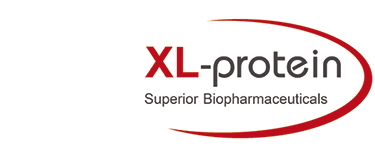XL-protein announces the Avi-PA(S)™ MAb platform to boost the preclinical and clinical development of therapies using its PASylation® technology
FREISING, GERMANY, July 12, 2021 – XL-protein GmbH, a German biotech company specialised in the development of biopharmaceuticals with extended half-life, announced today that key scientific data have been published in the Journal of Molecular Biology (2021, Vol. 433, Pub. no. 167113). The Open Access Publication “Molecular recognition of structurally disordered Pro/Ala-rich sequences (PAS) by antibodies involves an Ala residue at the hot spot of the epitope” is also available for download at XL-protein’s web site (http://www.xl-protein.com/key-publications).
PASylation® technology is based on the conjugation of pharmaceutically active compounds with a conformationally disordered polypeptide of defined sequence comprising the small natural amino acids Pro, Ala, and/or Ser, resulting in drastically enhanced stability in vivo. With its ground-braking technology XL-protein addresses a major limitation of biopharmaceutical proteins and peptides that often show fast clearance from circulation via kidney filtration, which strongly hampers efficacy in human therapy. PAS sequences are hydrophilic, uncharged, genetically encodable amino acid polymers. These PAS chains are conformationally disordered and occupy highly expanded hydrodynamic volume, thus showing biophysical properties very similar to poly-ethylene glycol (PEG) whose conjugation to drugs is a well-known method for plasma half-life extension.
PASylation® can be applied via genetic fusion or chemical coupling to many classes of pharmacologically active compounds, including proteins, peptides and low molecular weight drugs as well as nanoparticles, both for therapeutic purposes and in vivo diagnostics. PAS-drug conjugates show retarded kidney filtration and drastically prolonged pharmacokinetics (PK) in vivo. Likewise, PASylation leads to extended residence in the eye, where elimination of biopharmaceuticals also is strongly size-dependent, thus offering prospects for ophthalmology. The intrinsically uncharged PAS polypeptides do not interfere with the pharmacological activity of the drug component and show high stability in plasma as well as poor immunogenicity, while undergoing quick degradation and metabolization after cellular uptake. Therefore, PASylation® offers an attractive solution in applications with increased risk of PEG hypersensitivity.
With multiple projects heading towards clinical application and increasing interest from scientists in the biomedical area (as documented by a growing number of publications reporting the beneficial use of PASylation®) XL-protein succeeded in developing Avi-PA(S)™ MAbs as useful antibody tools for the preclinical as well as clinical development of PASylated drug candidates. XL-protein now offers these valuable immunochemical reagents to promote broader research on applications of PASylation® technology: https://xl-protein.com/shop
– End –
About XL-protein GmbH
XL-protein is a German biotech company commercializing its ground-breaking PASylation® technology, which enables the design of biopharmaceuticals with extended in vivo half-life and enhanced action. Based on a strong proprietary technology position, XL-protein focuses at the preclinical as well as clinical development of PASylated drug candidates in diverse disease areas. XL-protein is engaged in a growing number of partnerships with international pharmaceutical and biotech companies at various levels.
Download full press release:

